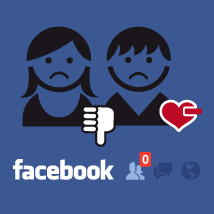How Facebook Hurts Your Self-Esteem and How to Stop It

Studies show that Facebook hurts your self-esteem, and I'm inclined to believe them. Social media sites, especially Facebook, create negative feelings and insecurity in many of my clients. Study after study has concluded that the more time spent on social media sites like Facebook, the lower the levels of self-esteem and self-worth. In fact, most people who spend time on Facebook actually report feeling worse about themselves, having lower self-esteem and more impulsive tendencies.
Studies Show That Facebook Hurts Self-Esteem
Recently, the media had a field day regarding research conducted by Cornell University. The study, published in the March 2013 edition of the Personality and Social Psychology Bulletin, suggested that Facebook can increase self-esteem. What the study clearly says, and many media folks misconstrued, is that respondents felt better when they looked at their own profile.
 Participants were given a task and when they did poorly, they looked at their Facebook profile; reassurance and strong bonds with family was reported. This did not suggest that looking at others' profiles was effective in increasing self-esteem. This study was also conducted with a substantially low participant size, 88 college undergraduate students. The idea of spending time on one’s own profile, connecting with family and friends, of course can help you feel better than focusing on the presenting problem. However, the research also revealed that if you navigate off your profile, Facebook can hurt your self-esteem.
Participants were given a task and when they did poorly, they looked at their Facebook profile; reassurance and strong bonds with family was reported. This did not suggest that looking at others' profiles was effective in increasing self-esteem. This study was also conducted with a substantially low participant size, 88 college undergraduate students. The idea of spending time on one’s own profile, connecting with family and friends, of course can help you feel better than focusing on the presenting problem. However, the research also revealed that if you navigate off your profile, Facebook can hurt your self-esteem.
The University of Pittsburgh and Columbia Business School published an overview of research in the Journal of Consumer Research (online in November 2012 and in print June 2013), claiming the above research is not factual. In evaluating five different studies about Facebook and human behavior, they concluded that too much time on Facebook can cause low self-esteem, impulsive behavior and problems in everyday life.
The outcome concluded that those who check Facebook more often have lower self-control, compared to those who view news websites and even celebrity gossip sites. The greater the social network use, the higher the body-mass index, the more binge eating, and the higher the level of credit-card debt, researchers wrote. Not only that, but the report indicated high social network use resulted in feelings of being "less than" everyone else.
Stop Facebook From Hurting Your Self-Esteem
 Don’t let social media sites like Facebook hurt your self-esteem. Think about these tips before logging on.
Don’t let social media sites like Facebook hurt your self-esteem. Think about these tips before logging on.
- Think about how you'll feel after posting a status update or simply scrolling through friends profiles. What if no one comments on something, will you begin to compare yourself to others? Will the act of going online right now (given your current mood) be helpful or harmful? Think about what your intention is before logging in.
- Honestly ask yourself “what is my intention for this?” What are you hoping to gain from this post or from this comment? Is it to educate, inform, or to boost someone’s mood? Or is it to try and show others what I am up to? Or is it to attempt to gain identity or an ego boost. If it’s the latter, then see if the pros outweigh the cons. Will you feel okay if no one comments or will you feel worse about yourself? Use this wisely.
- Use Facebook and other social media networks as tools to keep you informed on the world, not just your friends’ worlds. Fill your Newsfeed with news, areas of interest, people who inspire you. Like pages that can boost positive feelings, educate you or enhance or motivate you, such as HealthyPlace.com or The Guidance Girl.
- Edit your friends. Unsubscribe or hide friends that bring about negative feelings, cause you to compare, or bring up sadness. That means the friend who is always posting his new toys (car, boat, etc.) or the ex-romantic partner you still see pop up here or there, hide them. This does not mean that you must delete them, rather hiding someone keeps them from showing up on your page. Take control of your time and who you interact with online.
- Use Facebook for connection, but not your only means to communicate. Reach out and email, text, or communicate with close friends and family out of the social media atmosphere. These connections are richer and sink in deeper to your sense of self, rather than a photo like or quick comment.
- Remember, not everyone sees your posts. Many of my clients come in distraught that their best friend or a romantic interest didn’t comment or notice their post. Logically, not everyone will see it. Depending on when and where people are when they log on, they don’t always see everyone’s activity. Don’t take it personally, if you notice this is a trigger for you, build up your identity and self-esteem offline.
An occasional Facebook detox is healthy. There is no reason anyone needs to know where you are “checking into” or what you are up to every hour of the day. In fact, research and my own professional opinion suggests that this makes others perceive you as insecure. If you have to communicate on a massive playing field your daily activities, you are seeking out fulfillment rather than feeling it within yourself. Stop!
For just a day or two, see how many Facebook urges you have. Monitor them and don’t take action. Just see if you’re inclined to post. Nothing will change by taking a one day hiatus. If there is real news, someone will tell you or you will likely see it on television. Accept your ability to know you don’t need it to survive.
Sources
Lasta, N. A. (2013, March 25). Facebook Improves Self-Esteem; Study. Retrieved December 03, 2017.
Emily is the author of Express Yourself: A Teen Girls Guide to Speaking Up and Being Who You Are.You can visit Emily’s Guidance Girl website. You can also find her on Facebook, Google+ and Twitter.
APA Reference
Roberts, E.
(2013, March 27). How Facebook Hurts Your Self-Esteem and How to Stop It, HealthyPlace. Retrieved
on 2026, March 4 from https://www.healthyplace.com/blogs/buildingselfesteem/2013/03/does-facebook-increase-or-decrease-self-esteem
Author: Emily Roberts MA, LPC
Gossip columnists have a reciprocal relationship with the celebrities whose private lives are splashed about in the gossip column's pages. Of course, some gossip columnists can engage in borderline defamatory conduct, spreading innuendo about alleged immoral or illegal conduct that can injure celebrities' reputations. Yet at the same time, gossip columnists are also an important part of the "Star System" publicity machine that turns movie actors and musicians into celebrities and superstars that are the objects of the public's obsessive attention and interest.'
Kind regards
I just got off a Christian social site where you can make friends with other people that are on that site. The site was in honor of some type of christian music, so everybody was a fan. I was friends for 3 yrs on there with a lady that has agoraphobia but refuses to identify it as a mental illness. We broke up because she caused me a lot of heartach. I have BPD traits and generalized anxiety. My life is a mess right now.
